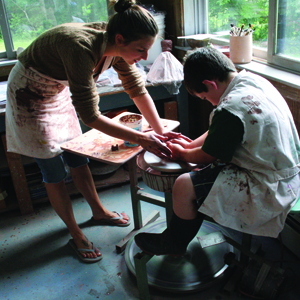 Approximately 12 million children and teens attend summer camp every year, but whether camps serve any larger purpose beyond filling long, hot days — from academic enrichment to personal development — depends on how well they’re designed and managed, according to a joint report by researchers from the American Camp Association and the Department of Parks, Recreation and Tourism Management at North Carolina State University.
Approximately 12 million children and teens attend summer camp every year, but whether camps serve any larger purpose beyond filling long, hot days — from academic enrichment to personal development — depends on how well they’re designed and managed, according to a joint report by researchers from the American Camp Association and the Department of Parks, Recreation and Tourism Management at North Carolina State University.
“The goals, program activities, staff attention and physical and emotional safety of camps are what make outcome achievement possible,” notes the report, called “Camp Experiences and Developmental Outcomes for Youth” and published by Child and Adolescent Psychiatric Clinics of North America. “Camps may be an underrecognized developmental setting in which young people find the desired supports and opportunities that contribute to positive development.”
Key to all this is carefully orchestrated hiring and training of the thousands of older teens and young adults who serve as staff, of whom approximately 65 percent return to work for multiple summers, according to the American Camp Association. “Leaders must be trained to know what the intended outcomes of the camp experience are and how to implement those outcomes,” the report asserts.
Or as Grant Bullard, co-director of the Gwynn Valley camp in Brevard, N.C., testifies: “Staffing is the most important thing you do. I’m only as good as my staff.”
As camp directors well know, the quieter winter and spring months are the time when the staffing groundwork gets laid for the next summer. At YMCA Camp Belknap in Mirror Lake, N.H., the hiring process for new staff takes place during a period of a few years — and the camp does not hire anyone who has not previously been camper.
The all-boys camp for ages 9 to 16 invites back the top 24 prospects from the previous year’s 16-year-old group to be unpaid trainees at age 17. Of that group, 16 are invited back at age 18 as paid leaders-in-training. If they’re invited back again at age 19, they have the opportunity to become cabin leaders, said Gene Clark, executive director of the 110-year-old camp.
“We adhere to a philosophy of homegrown leadership that was absolutely the norm in camping. … We’re very stuck in the mud with what used to be the model in the ’60s and ’70s,” he says. That means “I know everything about my staff,” Clark said, but Camp Belknap still does full background checks, from driving records to criminal of sexual abuse checks. “It’s not that we don’t adhere to the rules, but we do have the luxury of knowing, long before they are put in charge of children, their track record.”
Similarly, Bullard and his wife, Anne, bought the Gwynn Valley property and program about 17 years ago, and they’re starting to reach the point where former campers are coming back to work there, starting as 16- and 17-year-old junior counselors. “They know the philosophy; they know the routine,” Bullard said of former campers. “It’s a great asset to any organization, that you can train your staff even as young campers.”
When interviewing candidates, “We ask some pretty pointed questions,” he said. “You’re definitely interested in finding an individual who can work with those kids, and be a parent, role model and mentor all rolled into one. They’re the guide, they’re the disciplinarian, they’re the person who assists in making decisions and guiding that child so many different ways, and giving that child enough road to go in and out of their comfort zone, in a safe way.”
At Sanborn Western Camps in Florissant, Colo., the focus is primarily on finding young adults with an interest and some experience in working with children, more than it is finding people with skills particular to the western-themed camp. “We can teach them how to saddle a horse,” says Jane Sanborn, executive director. “But they have to have the inner desire to be with kids and make a positive difference in kids’ lives.”
Katie Blount, assistant director at Camp Waldemar in Hunt, Texas, doesn’t just want a pretty, smiley face to watch over her 300-plus campers, girls ages 9 to 16, who are supervised by 80 to 100-person staff. “I’d like to hire all nice, cute girls who can smile,” she said. “But I have to look deeper and hire girls who are more qualified in their areas of activity.” She asks each applicant pointedly what she believes makes a good camp counselor, and the answer “can make or break them pretty quick.”
Training older youth to aid kids
Once a staff is in place, camp directors turn to training. “The training and support that a counselor gets is imperative toward a positive camp experience,” said Peg Smith, executive director of the American Camp Association, which has standards around behavior management and discipline techniques geared toward positive outcomes. “We will train staff and encourage camps to train staff in helping kids to problem-solve and dealing with conflict resolution.”
Although Camp Belknap hires its own, the unpaid trainee year at age 17 serves as an opportunity to instill training through books and manuals as well as role-playing scenarios. They practice subjects from broad knowledge about child development to more specific strategies and tactics on bullying, food allergies, medical issues like bee stings and the perennial camp bugaboo of homesickness, Clark said.
Because younger staffers have been through the experiences themselves and have plenty of time to absorb wisdom from their supervisors before they’re put in charge of a group, when formal training starts, “You can immediately get into meaty stuff,” Clark said. “You don’t have to identify what the signs of bullying are. … When they’re working with a homesick child, 90 percent of them have felt that themselves.”
At Gwynn Valley, the central element of training is to instill in counselors the importance of bringing media-saturated children back to the wonder and innocence of childhood through values like simplicity, acceptance, appreciation of nature and a non-competitive environment, Bullard said. “Kids grow up way too fast. We get them up to snuff on our philosophy, how we deal with children, personal issues, bathroom issues and attention to special needs, whatever the child may come to camp with.”
They try to impart their training through role-play and other experiential means, partly to keep repeat staff engaged, Bullard said. “You’re hoping to get everybody on the same page. You want to impart the same information in different ways [and] challenge them in ways that allow them to think outside the box.”
At Drumlin Farm Camp in Lincoln, Mass., a farming camp run by the Massachusetts Audubon Society, nine days of training are broken down into sessions on working with one another, working with children, working in the farmyard, and working with nature, said Becky Gilles, camp director.
They bring in a behavioral psychologist named Anthony Rao, of the firm Behavioral Solutions, who counsels providing immediate feedback, “catching kids being good,” and attaching a consequence when they’re not. “How you relate to kids is often a lost opportunity,” Rao said. “It’s sharpening up your communication style.”
Sanborn Western spends a week to 10 days on youth development and how to work with kids, along with specific skills around working with horses or camping out. “The focus is how we’re going to create a community with the children who are coming and what kinds of issues they may be facing,” Gilles said.
Camp Stella Maris in Livonia, N.Y., has found it crucial to be dynamic in its weeklong presentation to staff, said Adam Bell, camp director. “When I started 15 years ago as an entry-level staff person, there was a lot of sit-down and listen to the camp director speak for days and days,” he said. “Now we incorporate video, role playing, experiential learning, so this generation of staff can retain all the knowledge.”
Christopher Thurber, who trains camp staff through his company Camp Spirit LLC — when he’s not serving as psychologist at Phillips Exeter Academy during the school year or as waterfront director at Camp Belknap during the summer — strives first and foremost to instill a sense of “tremendous responsibility” in older teenagers who are becoming junior counselors for the first time.
“They’re taking care of other people’s children. Perhaps there is no greater responsibility — or more important way to spend their time — than to be sterling role models for these boys and girls,” he said. “You need to shift your mindset from high school or college, where it was mostly focused on you, and your studies and your parties and your friends, to others. This servant leadership model is not one that some young people are ready to embrace.”
Adam Brooks, a consultant to camps and schools, points out that training staff to identify and stop bullying is vital. He said the tendency to dismiss it is dangerous, if a staff member thinks: “They got through it, so should these kids. That’s probably the worst thing they can do.”
“The No. 1 thing that I want camps to do,” said Brooks, “that I’ve worked with some of them to do — is work with their camp counselors,” he adds. “The No. 1 way you fight bullying and harassment is with [building] self-confidence and raising self-esteem.”
Ed Finkel is a writer, editor and Web content manager with 20 years of professional experience.































